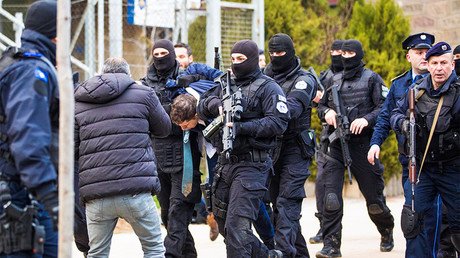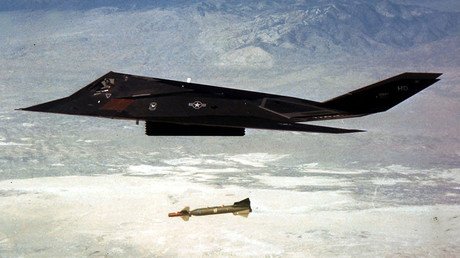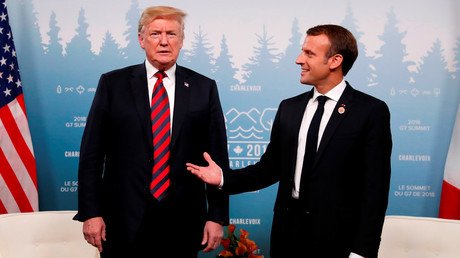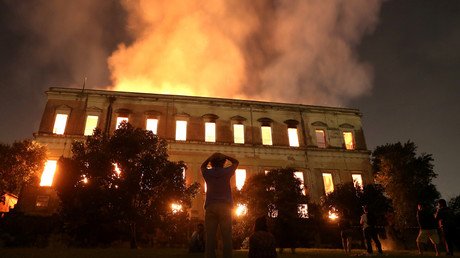Kosovo-Serbia land swap could send whole region into turmoil
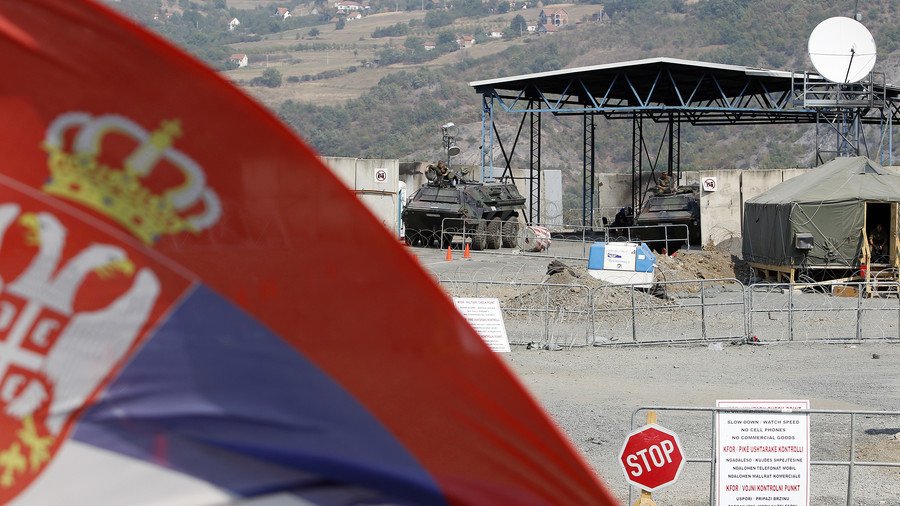
A land swap between Kosovo and Serbia could trigger a chain reaction in the Balkans, spelling the end for a number of former Yugoslav countries – and give a new reason for the US to keep troops in Europe, analysts have told RT.
The idea of land swap between Serbia and Kosovo along "ethnic lines" resurfaced this summer, reportedly floated first by Serbia's President Aleksandar Vucic. While not discussed officially, such plan would likely include Kosovo giving up Serb-dominated northern parts of the region in exchange for territory in southern Serbia in the Albanian-dominated Presevo Valley.
READ MORE: Kosovo has no foreign policy, ‘led by America’ – PM
Kosovo leader Hashim Thaci did not rule out possibility of such talks, describing the potential land swap as a "correction" of the border with Serbia. He firmly rejected the idea of partitioning Kosovo over any "ethnic lines," promising to present his Serbian counterpart with his plan early in September, when the two leaders are set to meet.
Such talks are needed for Kosovo to solve the outstanding issues with Serbia and move on towards its goals of NATO and EU memberships, according to Thaci. He, however, did not reveal what Serbia would get in return, apart from the vague prospect of a "European future."
"Definitely now is the moment to correct the border between Kosovo and Serbia, which is around 400 kilometers (250 miles) long," Thaci told Reuters in an interview in mid-August.
"Correcting borders will definitely avoid Kosovo's partition, swapping territories, more crises or problems or even possibly a new war."
Kosovo broke away from Serbia in 1999 with help of the NATO bombing campaign and unilaterally declared independence in 2008. The move was not recognized by Serbia and a number of other countries, including Russia, which regard it as a breakaway region. Kosovo and Serbia made steps to normalize relations, signing the Brussels Agreement in 2013, yet little has been actually achieved.
How likely is a land swap?
The very idea of land swap caused a storm of criticism both in Serbia and Kosovo. Should Vucic and Thaci actually manage to pull it off it would "be quite an achievement," given long-standing tensions persisting in the region, author and Russia analyst Martin McCauley believes, yet such scenario is not very likely.
Simply giving up contested lands to Kosovo is even less likely, as Serbia's Vucic has faced strong backlash in his country over making any sort of deal with Kosovo Albanians.
"Vucic is faced with great opposition in Serbia itself – the Serbian Orthodox Church has come out firmly against recognition or division of Kosovo in any shape or form. All public polls show that the majority of Serbs are against either recognition of Kosovo or partition of Kosovo," political analyst Aleksandar Pavic told RT.
In Kosovo, Prime Minister Ramush Haradinaj became one of the most vocal critics of the land swap idea, calling the very discussion of it "an invitation for new tragedies in the Balkans."
The public discussion on the redesign of borders & exchange of territories is an invitation for new tragedies in the Balkans, triggering instability, insecurity & risking to undermine the long-term political & security investment for stability & peace in Kosovo & region. 5/6
— Ramush Haradinaj (@haradinajramush) 31 августа 2018 г.
"If we reopen what has already been agreed, it means re-opening the past, and in our region reopening the past means reopening wars. All these borders are the result of tragic wars," Haradinaj told the Irish Times. He then made a trendy jab at Russia, saying that only President Vladimir Putin would somehow benefit from a new conflict in the Balkans.
In reality, however, Russia, has already clearly stated that its position on the Kosovo issue remains unchanged and that it would accept any solution supported by the people of Serbia. Russia's Foreign Ministry urged all the parties to abide by international law and stick to already adopted UN resolutions.
US backs a 'satisfactory settlement'… to suit its own interests?
Washington has shown apparent support for the idea of a land swap. National Security Advisor John Bolton stated that the US would not oppose a "mutually satisfactory settlement" between Belgrade and Pristina, including possible territorial changes.
"Our policy, the US policy, is that if the two parties can work it out between themselves and reach agreement, we don't exclude territorial adjustments," Bolton said back on August 24. "We would not stand in the way, and I don't think anybody in Europe would stand in the way if the two parties to the dispute reached a mutually satisfactory settlement," he added.
Any agreement of such sort might indeed be "satisfactory," but only for the US itself, as it would fuel tensions in the region and open prospects for new armed conflicts, political analyst John Bosnitch warned.
"There's no doubt that it serves American interests in Europe when there's instability on European continent, that Germany and other EU states are unable to control without the American muscle," Bosnitch told RT.
US support for the land swap idea might also come from the lack of understanding of the situation in the Balkans, which proved to be the most explosive region of Europe for over a century. And the past US actions in the region proved to be quite counterproductive, author and Russia analyst Martin McCauley told RT.
"The United States hasn't played a major role in the Balkans. The United States has traditionally found the Balkans to be very difficult to understand," McCauley said.
"The United States has a role to play here but its record is not particularly good, because they have had difficulty in thoughtfully understanding the area."
EU not so sure
In spite of Bolton's certainty, not all EU countries appear to be on board. Luxembourg's Foreign Minister Jean Asselborn warned about "very negative consequences" such deal might produce, with his Finnish counterpart Timo Soini calling it "risky."
"We believe that this can tear open too many old wounds in the population and so we are very skeptical," German Foreign Minister Heiko Maas said on Friday.
If such land swap actually took place, it is likely to trigger a chain reaction in the region, with ethno-religious minorities in neighboring countries demanding autonomies and ultimately secession, McCauley warned. Such course of events is particularly dangerous for Bosnia and Macedonia, which have large ethnic and religious minorities.
"If a land swap does take place between the Serbs and the Albanians it will set an immediate precedent for a land swap in Bosnia, that will probably lead to the departure of the Serbian part to join Serbia and to separation of the country into two pieces," Bosnitch said. "And in the case of Macedonia, it will result in a situation in which the Albanians would demand to leave Macedonia. And the Albanians have assertive majority control over more than the half of Macedonia in the area bordering Kosovo."
Think your friends would be interested? Share this story!
